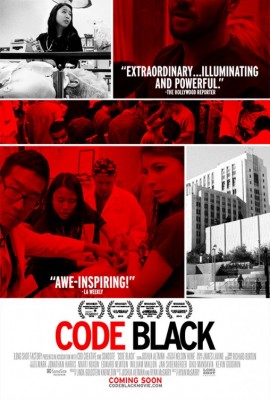Film Reviews

Code Black
Genre: Documentary
Director: Ryan McGarry
Cast: Danny Cheng, Andrew Eads, Jamie Eng
MPAA-Rating:
Release Date: July 11th, 2014
“I get really frustrated with the health care debate on a national level, salve ” states one of the young physicians featured in the new documentary Code Black. He has his reasons, unhealthy which are displayed all too realistically in this painfully honest feature that dives into the emergency room facility of a public Los Angeles hospital and urges viewers to witness our nation’s health care shortcomings firsthand.
For those looking for a simplistic piece of evidence that suggests easy answers to the questions swirling around Obamacare, hospital regulations and the lawsuits weighing down our health care system, you won’t find it here.
Code Black smartly lets the emergency room doctors speak out themselves about the problems they face every day.
At first, these doctors start talking about something as simple as C-booth, the old emergency room area of the former Los Angeles public hospital. In the pictures and videos of the area, it looks like a chaotic atmosphere of triumphs and losses where several dozen doctors serve the needs of frustrated patients, who could die at any moment. C-booth was beloved by many of the physicians who saw it like a 20×25-foot battlefield where an army of doctors fought valiantly against spreading diseases, growing gun shot wounds and the impatience of heart attacks. Some patients were saved and others were lost there and the government waived its regulations to protect this area.
Later on though, the flaws with the now-empty C-booth are clearly articulated. There was little privacy. There was chaos. Patients were underappreciated and sometimes when they died, they were cast aside in the hospital in areas where you wouldn’t want to say goodbye to an earring let alone a lost parent.
That’s the superior depth of this documentary. It lets viewers see a complex issue from several different standpoints. After the viewer starts to agree with one point of view, the film shifts gears and offers another perspective. The same depth is realized when the movie focuses in on endless regulations (“I go to the bathroom and want to log in,” one physician states), the debate about patients skipping in line in the emergency rooms (of course some of the patients requiring less work should jump ahead in certain scenerios, right?) and lawsuits (one doctor states that he oftentimes updates the chart for defense purposes and not for the patient’s well-being).
Throughout the piece, young doctors are introduced who want to make a difference but find bureaucratic roadblocks in the way. Do some of those roadblocks makes sense? Absolutely but it’s easy to see the doctor’s perspective on this. They didn’t sign up to be doctors to file paperwork or to deal with endless regulations. They signed up to save lives.
Code Black, with little hesitation or equivocation, knows its purpose and succeeds in its mission. It introduces doctors frustrated in an overwhelming system and shows what often prevents them from doing what they love the most. Several of the doctors were once patients themselves (one survived a major battle with cancer while another one watched his best friend get severly injured in a car accident.) They know what it’s like to deal with doctors and a system that seemingly doesn’t care for patients as much as it should.
It’s not surprising that one physician is frustrated with the health care debate in Washington D.C. The debate often loses sight of the doctors and patients so integral to the system. Code Black proudly and painfully puts the focus back on those doctors and back on the patients.
Back where it belongs.
If you want to talk about the health care crisis in this country, I suggest you watch this movie.
Review by: John Hanlon









